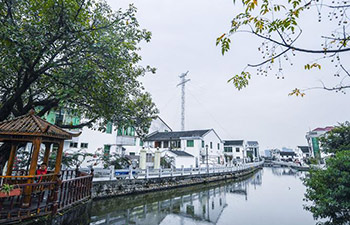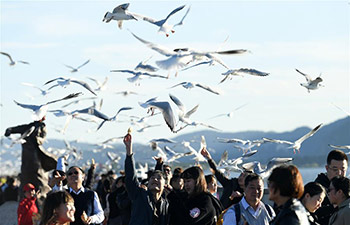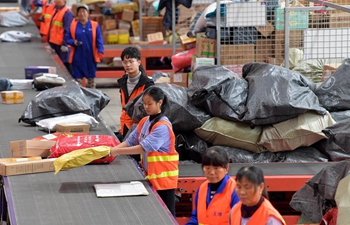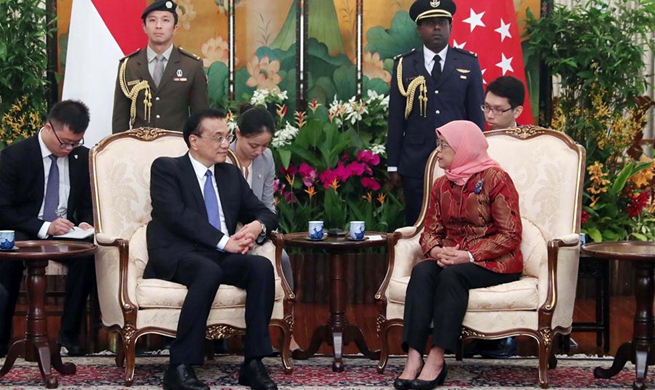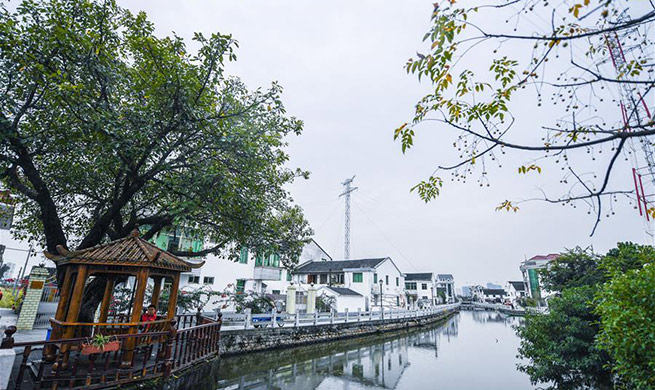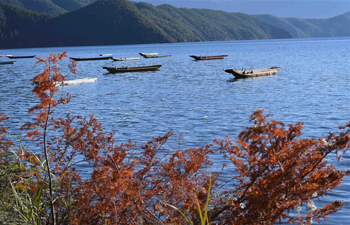BAGHDAD, Nov, 15 (Xinhua) -- Worse living conditions and fragile security have pushed many Iraqis to leave their houses to refugee camps in many areas previously under control of the extremist Islamic State (IS) group.
Jassim al-Afri, head of al-Alam town council in Iraq's northern central province of Salahudin, told Xinhua that the displacement of these Iraqis this time is not because IS group seizes their lands but because security forces can not guarantee their safety after dozens of attacks by remnants of IS militants.
The IS attacks paralyzed the agriculture which makes the living of most population of the villages in the northern part of Salahudin province and Hawijah area in west of the neighboring Kirkuk province.
"The authorities in the town of al-Alam, some 15 km east of Salahudin's provincial capital Tikrit, received some 4,000 families, who left their homes again from many villages in Hawijah area," Afri told Xinhua.
About 3,500 of the displaced families are living in squalid squatter settlements and many of them are living on casual jobs, while some 400 families resorted to the former refugee camps which are sponsored by the Iraqi Ministry of Migration and Displacement as well as some international relief organizations, according to Afri.
"There are some 50 families of IS militants who are living separately in a camp and are receiving humanitarian aid from the international organizations," Afri added.
Afri said that the town's authorities had let the displaced people to choose their shelters, and most of them preferred to live outside the camps even if in abandoned buildings without roofs.
"They are facing difficulties especially as winter has come with its cold and rainy weather, but the administration of al-Alam and its people are presenting some basic needs to those families," he added.
The town of al-Alam had received thousands of families during the years between 2014 to 2017 when IS group made a significant blitzkrieg and seized large territories in the predominantly Sunni provinces in northern and western Iraq.
In December 2017, Iraqi forces recaptured all the areas under control of IS, which led most of the displaced families who fled their home due to the battles to return to their towns and villages.
However, during the past few months many families have left their towns and villages again because of security concerns and lack of jobs.
Ibrahim Mahmoud, a householder who lives in an under construction building at the edge of the town of al-Alam said "my son was killed in terrorist attack on my house in Hawijah, so I decided to return to al-Alam to protect my young boy and six daughters."
"Security in areas in west of Hawijah is absent and IS militants control all the surrounding areas at night while security forces control the main roads only. Therefore, during the night IS militants attack civilian houses to kill and terrorize the residents," Mahmoud said while he was sipping a cup of tea near a ruined house where his family lives.
Mahmoud used to make his living in his farm in west of Hawijah, but things differ now in the liberated areas after fierce battles that defeated IS group from Hawijah area.
"Almost everything is destroyed in our villages in Hawijah and the agricultural system which we used to live on has been heavily collapsed, let alone the acute shortage of electricity which we depend on it to convey water to the farms, and most importantly the lack of security," Mahmoud added.
"Here in al-Alam I live in peace and feel secure, I work sometimes here and there and my family frequently receive aid from residents of the town and international relief organizations," he added.
Um Ahmed, 65 years old, told Xinhua the tragedy of her family when IS militants took control of her village in al-Masalkha area, some 60 km north of Tikrit.
She said one night in 2015, the extremist militants attacked her house and kidnapped her husband and her elder son and killed them later after they accused them of cooperating with the security forces.
The crime of IS forced Um Ahmed and the rest of her family members to leave their house and resort to the town of al-Alam.
After the liberation of al-Masalkha area, Um Ahmed returned to her house and hoped to work in her farm, but the reemergence of IS militants in the previous months near her village and the nearby Makhoul Mountain forced her to consider leaving her house again and go to al-Alam.
"Recently, Daesh (IS group) attacks against security forces and civilians have increased in my area, and I asked my sons to leave again but they refused until one day my other son was killed more than a month ago when a huge explosion of a roadside bomb went off at our farm," Um Ahmed said.
"I am here in al-Alam because I want to save my 13 and 14 years old sons and my three daughters," she said with tears.
At the edge of refugee camp in al-Alam, some 50 families of IS militants are kept in fenced area and have been living under security restrictions to be separated from other displaced families.
A father of one of IS militants complained that they are "paying the price of a crime that they didn't do. One of my family's sons made a mistake and joined Daesh without asking my permission."
However, the man who refused to be named said that he and his family members are getting humanitarian assistance and have been treated well by the officials responsible for the camp.
Iraq declared the defeat of IS group late in 2017, paving the way for millions of Iraqis to return to their homes in the liberated towns and villages.
However, groups and individuals of extremist militants melted or regrouped in urban or fled to desert and rugged areas, and are carrying out attacks against the security forces and civilians.





